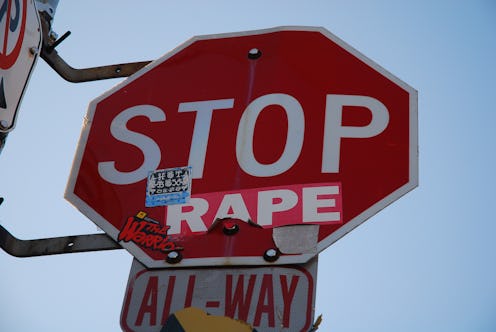
In honor of the International Day for the Elimination of Violence Against Women on Wednesday, Nov. 25, Lithuanian women's rights organization Moterys Kalba (Women Speak) created a video titled #Musudaug ("#ManyOfUs"). Women Speak's #ManyOfUs video presses men to empathize with sexual assault victims by asking them to read from pieces of paper deceptively marked with childlike drawings that actually contained the stories of women's assaults. Judging by the men's reactions, these stories were eye-opening for many of them.
Sexual assault is all over the news these days, but amid all the political debates, we can lose sight of the impact this crime has on victims. In order to get men to connect to the issue on an emotional level, Women Speak solicited stories from survivors through its Facebook page and presented them to the six men, who read them out loud in the video and then gave their reactions. They organization also created the hashtag #ManyOfUs to get people talking about the problem and how prevalent it is.
While any form of awareness-raising is positive, this project is not without its flaws. First off, asking men to read women's stories in order to understand what it's like to be a sexual assault victim presumes that none of these men have been assaulted themselves and that only women can teach them what it is like. This isn't true: One study found that 38 percent of victims of sexual violence were men. According to the Rape, Abuse and Incest National Network (RAINN), one in six men has experienced sexual abuse during childhood, which means it's likely that at least one man in that video has.
In addition, one of the letters reads, "This message is for those guys who party hard and drink 'til they drop. As much as you want to satisfy yourself, please resist." While this advice should be taken, its phrasing perpetuates the belief that rape is the result of difficult-to-control physical urges rather than misogyny, toxic masculinity, and desire for power. It's possible that the phrasing is the result of the translation into English, but it's still worth remembering here that, as Jill Filipovic wrote in The Guardian in 2013, "rape is about power, not sex."
And there is also this: Any attempt to make presumed non-survivors more connected to the plights of survivors shouldn't need any special effort to empathize. As Maya Dusenbery points out on Feministing, men shouldn't have to imagine women as their daughters, wives, or mothers to care about their struggles. #ManyOfUs similarly tries to get men concerned about sexual assault by personally connecting them to it, and one letter asks at the end, "Would you want your daughter to experience what this girl has been through?" At the same time, the reality is that men are frequently — and in many locations around the world — taught not to empathize with women; as such, any effort to get them to picture themselves in women's shoes might help reverse this socialization.
With all those caveats in mind, here are some important conclusions that men drew from the stories they read:
1. Sexual Assault Should Not Be The Butt Of Jokes
After reading an account of a woman assaulted during her preteen years, 27-year-old Olegas realized how twisted it is to make light of such incidents. "Sometimes comedians like to make jokes about pedophilia and other similar topics," he comments. "When you're joking, it seems like you're laughing at the fear. Laughing at that problem. And that problem doesn't seem as scary anymore... But these stories actually make you face the reality." As Lindy West points out on Jezebel, rape jokes are possible when they attack perpetrators, not victims. But jokes like Daniel Tosh's "Wouldn’t it be funny if that girl got raped by, like, five guys right now?" only serve to trivialize an issue that's already not taken seriously enough.
2. We Should Hear About This More Often
"We should talk more about these stories. People should be more aware of it," reflects journalist Sarunas Cerniauskas, after asking, "Are there many stories like this?" It's disheartening that a journalist doesn't know there are, in fact, many stories of sexual assault or realize there are online forums, like the Tumblr I believe you | It's not your fault, where people are sharing these stories. Hopefully, projects like #ManyOfUs can bring more mainstream attention to the issue.
3. The Shame Should Be On The Perpetrator, Not The Victim
"There should be no feeling of guilt or shame after experiencing that. That guilt and shame belongs to those who raped them," reflects Andrius Mamontovas. Unfortunately, guilt is a common emotional reaction to rape for survivors, according to DomesticViolenceServices.com. In reality, as a RAINN counselor told survivor Aspen Matis, "No one causes rape but rapists," so only the perpetrator, not the victim, should feel ashamed about the assault.
Watch the full video below:
Images: Nigsby/Flickr; Moterys Kalba/YouTube (4)